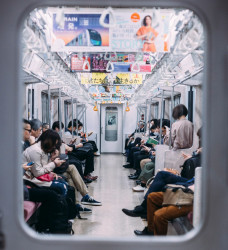
Originally published on metropolis.co.jp on February 2010

Shane Busato
In economics, an “externality” refers to the impact that the production and consumption of goods has on a third party. For example, the high use of antibiotics in the meat and poultry industry has contributed to the rise of drug-resistant bacteria, which don’t care if you’re a vegetarian or not.
In the marketplace, the cheap goods we all love also come with hidden externalities attached, meaning our decisions as consumers affect the lives and well-being of people sometimes thousands of miles away. Which leads to the question: what sort of ethical dilemmas might be stitched into the fabric of the humble cotton T-shirt?
Actually, from start to finish, the costs of making that cheap tee are passed off to people other than the eventual consumer. Growing cotton causes water shortages where rivers or lakes are diverted for irrigation. Meanwhile, run-off from the fertilizers contributes to pollution. For the actual production, manufacturers often seek out places where labor is cheap and regulation lax, meaning that the low price you enjoy might be the result of children or exploited workers laboring long hours in poor conditions. Then there are the environmental costs associated with packaging, transport and eventual disposal.
For a long time, these sorts of costs were the dirty secret of mass-produced goods. But recently, an ethical consumerist movement has arisen that encourages people to take a closer look at where products come from and how they’re produced. Terms like “fair trade”, “organic”, and “locally grown” have become buzzwords, and consumers seem to accept the fact that they must pay more for goods that don’t compromise their sense of morality.
But according to Adam Neiman,CEO of innovative clothing manufacturer No Sweat Apparel,charging more for ethical goods is never going to allow for systemic change. While people would prefer to have clothes that weren’t made in a sweatshop, they also have a budget to stick to. So he and his wife have set about building a company that offers union-made, sweatshop-free apparel at reasonable prices.
“We prefer [this] because we are attempting to create a viable model that addresses both the needs of the workers and the corporations in the garment industry,” Neiman tells Metropolis. “We believe that our success — and the unions we support — will encourage employers to shift production to union shops.”
The Boston-based company conducts a thorough examination of all suppliers it does business with, sometimes requesting improvements before agreeing to work together. “We look at the history of our sources, their track record, their leadership and their rank and file,” Neiman says. “We will source from any country we can find that has good shops, producing good quality, competitively priced garments, represented by independent trade unions.”
More importantly, No Sweat makes all the information about their sources open to the public on its website. “We are the first — we think, the first of many — apparel maker to go open source. We will tell you about our sources, highlight them, show them off. The workers who make our clothes will have living wages and decent working conditions; they will have unions. Will that lead our competition to the same shops? Excellent. We want our sources to thrive. That’s the whole point.”
No Sweat also keeps costs down by not doing any advertising. But that doesn’t seem to have hurt them — they’ve enjoyed strong word-of-mouth support. The brand previously ran an online store to directly serve customers, but is now concentrating on its independent retailers and custom wholesale business. In fact, Neiman is hoping to find some retailers in Japan that would be interested in carrying the No Sweat brand, so you may soon be seeing it on the shelves of your favorite boutique in Harajuku or Shimokitazawa.
To find out more about No Sweat, see www.nosweatapparel.com.







